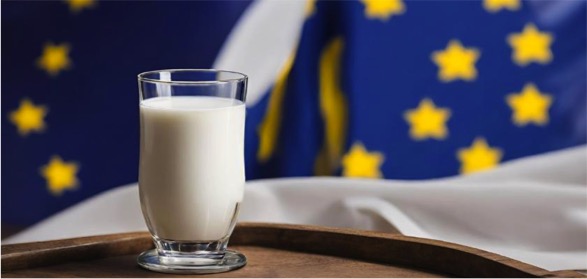The ongoing implementation of environmental regulations, called the European Green Deal, and low agricultural commodity prices have sparked numerous farmer protests across Europe. Dairy has not been immune as new regulations weigh on milk production. November EU milk collections fell to levels not seen in years, according to Betty Berning, analyst with the Daily Dairy Report.
Approved in 2020, the European Green Deal is a set of policy initiatives designed to help the trading blocreduce net greenhouse gas emissions by at least 55% by 2030, compared to 1990 levels. The initiatives extend to many different sectors of the economy, including construction, biodiversity, energy, transportation, and food and agriculture.
“The protests occurring across the continent underscore farmers’ frustration with low revenues and increased restrictions,” Berning said. “While governments seem to be listening, it’s unclear whether meaningful action will be taken. Moreover, with environmental limits already in place in Ireland and the Netherlands, change could come too late to cause a significant shift in the trajectory of the EU dairy sector.”
November milk production in the European Union and the United Kingdom fell 2.5%, compared to a year earlier, to 26.6 billion pounds, based on preliminary data and estimates from Eurostat, CLAL, and the UK’s Agriculture and Horticulture Development Board (AHDB). November milk production was the lowest for any November since 2018 and the fourth month in a row that volumes declined on a year-over-year basis. Ireland’s November milk collections plunged 20%, or 218.3 million pounds, to 882.4 million pounds vs. November 2022, as the country headed into its seasonal low.
“Ongoing environmental restrictions have been pushing production lower across Europe, and November’s production loss highlights the continent’s ongoing reduction in milk flows,” Berning said.
Through November 2023, annual year-over-year milk production was up a marginal 0.1%, with losses beginning in August. According to USDA’s October estimates, Europe’s trend toward declining output will continue into this year, with 2024 milk volumes forecast to drop 0.14% from 2023 levels to 320 billion pounds.
“German farmers took to the streets of Berlin in late January to protest rising taxes and a lack of subsidies,” Berning noted. “The demonstrations were part of ongoing farmer protests as Germany rolls out austerity measures to cover holes in its budget.”
Reuters and other news outlets reported that similar demonstrations have been occurring in other countries since late last year. Farmers in France, for example, have blocked roads around Paris as they call for “urgent action on low farmgate prices, green regulation, and free-trade policies,” according to Reuters.
Some headway could be occurring in France, where Prime Minister Gabriel Attal said he will not reduce tax breaks for diesel fuel destined for agricultural use, one of the farmers’ chief grievances. He also said the government will distribute emergency funds more quickly and levy substantial fines on corporations that do not follow price negotiation rules.
“Farmers in Poland have voiced concerns over agricultural imports from Ukraine as well as over the European Green Deal,” Berning said. “Agricultural products from Ukraine have reportedly been flooding Poland’s market as demand remains low in the war-torn nation, causing Polish farm revenue to drop.”
Source : Dairy Herd Feb 2nd 2024

